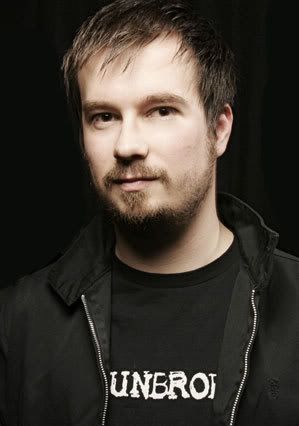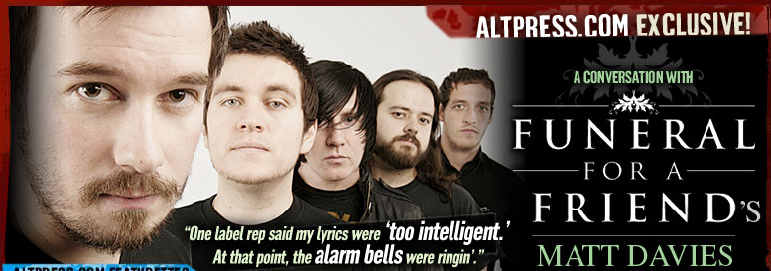___leegaze
in
ffaf
Alternative Press Web Exclusive Interview
Web Exclusive: A conversation with Funeral For A Friend's Matt Davies

Posted by Rob Ortenzi on 29-Oct-08 @ 10:42 AM
FUNERAL FOR A FRIEND may have achieved a bit of early crossover success thanks to Seven Ways To Scream Your Name, a compilation EP released by Ferret Music in 2003 that provided a prime and pristine example of early-2000s screamo. Over the course of four full-lengths, the U.K. mainstay have slowly developed and focused their melodic-rock sound while frustrations with their label, Atlantic Records, mounted to awkward proportions. By the release of 2007's Tales Don't Tell Themselves, the band were ready to depart and do things on their own--literally. Their newest album, Memory And Humanity, was released on their own label, Join Us, earlier this month in their homeland. But the band sought a bit of help for international distribution, licensing it to Victory Records in the U.S. and Canada, and Roadrunner for the rest of the world. Brian Shultz recently spoke with frontman Matt Davies about their retooled methods--in everything from their songwriting and a member change, to a lower-key approach and newly embraced DIY route.
What prompted the band to go back to more of a song-by-song model following after the underlying concept of 2007's Tales Don't Tell Themselves?
I know it's not really a main explanation, but we got together at the end of last year after we completed the touring cycle for Tales and just started writing. I kinda knew after Tales was done that I didn't really want to focus my attention too much more on conceptual things for the next record. The songs [I was writing] for the album developed into being more song songs. So it was pretty cool to get back into the swing of writing individual songs without having to think of some kind of development or particular story on them. It's more [along the lines of] interpretations on what I often see around the world or around me and whatnot. It's [still] kind of a continuation of where I was on the last stuff.
Earlier this year, your drummer, Ryan Richards, mentioned the album would have more harsh, screaming vocals and riffs in line with 2003's Casually Dressed And Deep In Conversation, but I don't really hear much of that on Memory And Humanity.
Tales in itself was pretty much a dynamic record more than an aggressive record. I wanted to write songs for this record that [were] more punctual. It's a bit more dry. It happened so that we'll go write the songs so it'd be more natural to incorporate aggressive vocals; we would incorporate some elements. [Certain songs, it would add] that extra emotion there, where on Tales it didn't benefit from those kind of elements. We brought them back and used them as tools in our songwriting because it [highlighted] the idea and actual emotion of the song.
In the past you've worked with some rather big producer names like Gil Norton and Terry Date, but for Memory And Humanity you went with a much more low-key guy in Romesh Dodangoda. Was that because of a smaller budget?
No. I think for us it was more in line to work with somebody who thought the same way about music--someone who wasn't trying to kind of... Somebody like Gil or [Terry], their reputation precedes them. We wanted to work with somebody who was really hungry, who was really dedicated to producing a record with us. I think it worked pretty well. I think we brought out the best in him and he brought out the best in us. And now he's working with a bunch of cool upcoming bands on the U.K. scene--bands like Kids In Glass Houses, the Blackout, Lostprophets and stuff like that. He was genuinely excited to be working with the band. And that kind of rubbed off on us. He's a really cool guy, and now we're really good friends.
So would you say you've butted heads with producers in the past?
Some yes, some no. On certain things. I think I've gotten pretty lucky with my kind of input with the records and with producers. We've never really had arguments [or] anything like that. I think that after working with so many different kinds of producers for the three previous records, we kind of realized that [in some ways] we could actually go in and take control of everything ourselves. We were comfortable because we knew what we could do. For us, it was also because we ended up with a record that's probably one of the best-sounding records we've done, on maybe a third of the budget. [Laughs.] So it's cool that you can make records that shine and sound bright without having to spend [exorbitant] amounts of money on it.
How did you benefit from self-releasing the record as opposed to having a huge label back it?
Being in control. Having the ability to [oversee] every part of what you do. To see if [every part] could be done better is a massive [task] for us right now in our career, because we feel like we're totally--we have the reins on everything. Not many bands have the opportunity to do that. We've come out on the other side of [separating from] a major label and are all the better for it. You learn a hell of a lot working with [them]--how things can be done, how things can't be done.
What were some of the challenges in doing so?
Maybe the whole marketing aspect and the representation of the band. We've always been kinda cautious of the way the people want to try to present us as a band, because we're not like a flamboyant band, like My Chemical Romance or some of those. So there's no kind of image, so to speak, with us. We don't try to present ourselves as some fantastical band of rock 'n' roll... The music does the majority of the talking for us. And that's the thing. We wanted to be able to kind of make that--to really reinforce being a fan's band. Keeping in touch with our fans through the website, the MySpace, video blogs and stuff like that. Those are challenges that we kind of rose to. We wanted to work the record label and band into an environment where it was fresh and exciting for us and the fans involved.
What were some of the issues you encountered while on Atlantic?
[Initially], it wasn't so bad because we had a lot of fans of the band there, because they were in the U.K. more or less. There were a lot of people who really supported the band and knew where we were coming from. But as [with any] major label over the years, people get fired or people leave. And we worked with people who didn't understand where we were coming from [or] what we were trying to do. [One criticism from someone] was that my lyrics in a particular song were "too intelligent." [At that point,] the alarm bells were ringin' and whatnot, [and we realized,] "These people just don't get what we're trying to do at all, and maybe it's not good for us to be there." We released the first single in the U.K. and [from there], the record pretty much killed. [But then] we came out to the States and did Warped Tour. We were playing there because there was no support for us [elsewhere]. The label had people telling us how much they loved the band [and] how much they loved the record, but it wasn't backed up by any kind of drive while we were touring [America]. So we ended up playing our asses off, being a one-band promotional team.
Are you planning to release records from other bands on the Join Us label?
For us, that's a dream and something we hope to achieve once we've got the label solid, over the next 10 months or so. We love so many diverse kinds of bands and so many different styles of music. It would be a fun thing to do.
Have you been talking with any specific bands about the possibility of it?
We're always mentioning it. There are a lot of bands that we've toured with over the years. We're not saying too much [yet]. What we're doing right now is important to us--supporting the new album and everything. We're always talking to bands we come across. Maybe one day we could help them out. [Laughs.]
I know former bassist/vocalist Gareth Ellis-Davies just departed the band last month and Gavin Burrough stepped into replace him. Have you already seen a dynamic change in the band at all over that time?
Yeah. It is another change, really. He's really energetic. He's a fantastic songwriter. He's an awesome vocalist. We're actually doing vocals now that we couldn't do with Gareth in the band because Gareth was an incompetent kind of singer. We're on tour at the moment and [the reception] has been awesome. Kids really take to him. They don't care--the music is important to them. It's fun. He's an energetic fella. He is part of the band.
How do you think his songwriting contributions will affect the next record?
We're really excited about seeing how it develops because he's been in a band before, where he was the main songwriter. It'll be interesting to see where the band goes. It's definitely gonna bring an element of excitement amongst us.
source
--
This was also on the main page of the site leading to the interview:
